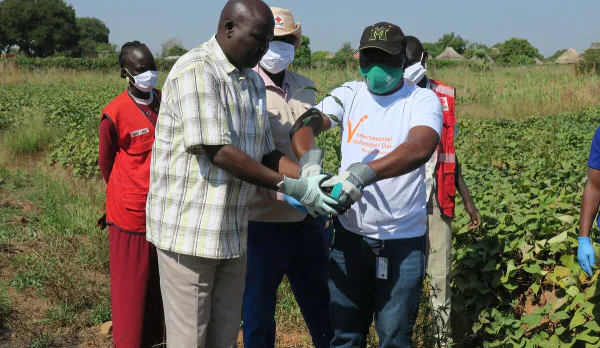
| Some 15 UN Volunteers serving with the United Nations Mission in South Sudan joined hands with the state government to plant fruit bearing trees |
| AWEIL, South Sudan, December 5 is annually commemorated as International Day of United Nations Volunteers. In Aweil, Northern Bahr El Ghazal, some 15 UN Volunteers serving with the United Nations Mission in South Sudan joined hands with the state government to plant fruit bearing trees around the town. One of them is 39-year-old Fred Ombisa from Kenya is one of them. A water and sanitation technician, Fred has been working with the UN Peacekeeping mission in the world’s youngest nation for the past three years. “I feel happy to help the community of Northern Bahr El Ghazal,” says Fred. “We have done a lot of water distribution in the area and rehabilitated the Aweil Civil Hospital, including its toilets and installed water tanks for the hospital,” he adds. Fred and his colleagues partnered with the South Sudan Red Cross to plant some 100 trees. The activity had two objectives: to combat climate change and increase food security for local communities. “The entire world has been affected by climate change,” reveals Fred. “Therefore, we joined hands with state authorities to contribute to this global issue through the simplest means possible—by planting more trees. Since these are fruit trees our hope is that they will also be useful for citizens of Aweil for years to come,” he avers. “We joined the planting of trees because we believed that environment is very important. As such, we need to work together to protect it,” adds Sarwah Qader a UN Volunteer and a Gender Affairs Officer with UNMISS. This ‘Go Green’ initiative has been facilitated by the South Sudan Red Cross. “Our aim is also to mitigate hunger. We are planning to plant some 100,000 trees in total across the country,” reveals Peter Kuot Dut, of the South Sudan Red Cross in Aweil. UN Volunteers at UNMISS and across the world embody the spirit volunteerism and work tirelessly to advocate for the inclusion of those often left behind. |
